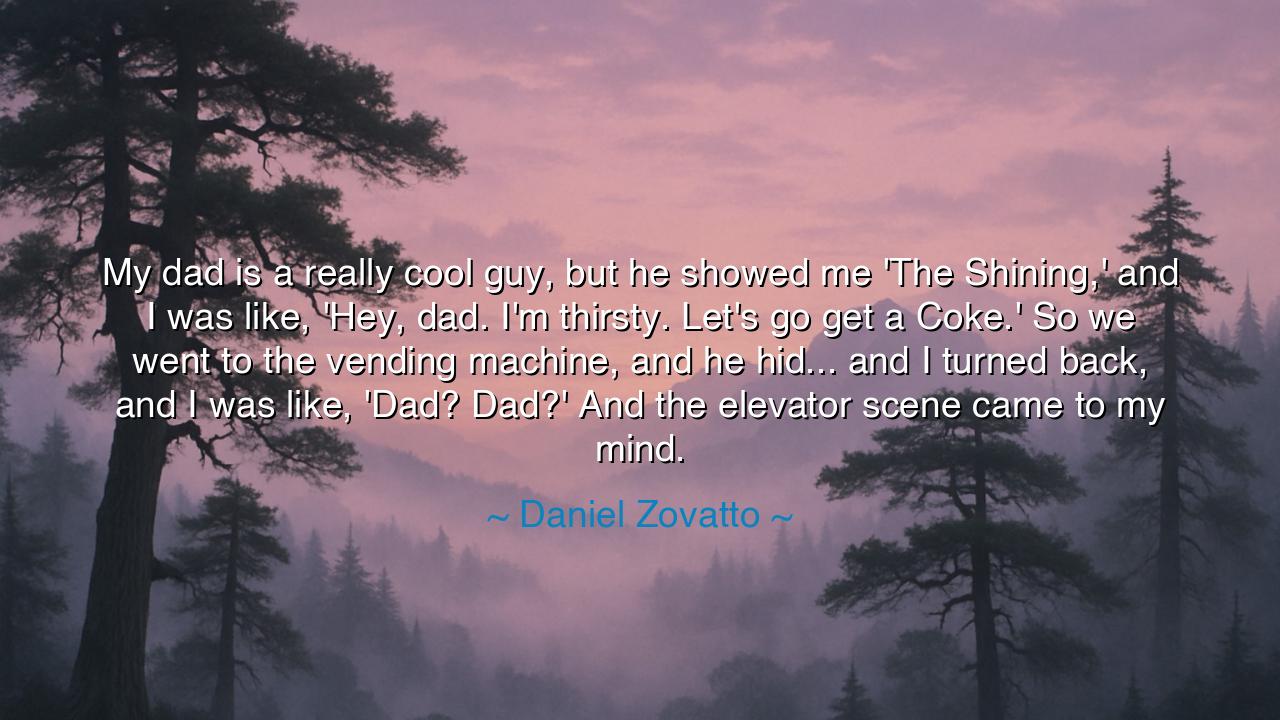
My dad is a really cool guy, but he showed me 'The Shining,' and
My dad is a really cool guy, but he showed me 'The Shining,' and I was like, 'Hey, dad. I'm thirsty. Let's go get a Coke.' So we went to the vending machine, and he hid... and I turned back, and I was like, 'Dad? Dad?' And the elevator scene came to my mind.






“My dad is a really cool guy, but he showed me ‘The Shining,’ and I was like, ‘Hey, dad. I’m thirsty. Let’s go get a Coke.’ So we went to the vending machine, and he hid... and I turned back, and I was like, ‘Dad? Dad?’ And the elevator scene came to my mind.” Thus spoke Daniel Zovatto, an actor of our age, in words that mix humor with an undercurrent of something deeper—the mingling of fear, innocence, and memory that binds every child to their parent. At first glance, his tale seems light, almost playful—a son recalling a mischievous prank by his father. Yet beneath this jest lies a reflection on one of the oldest and most powerful forces in human life: the fragile dance between trust and fear, between childhood’s wonder and the awakening knowledge of the unknown.
In the story, we see not merely a father’s harmless joke, but the echo of something universal. The young Daniel, frightened by The Shining, that tale of madness and isolation, carries the haunting image of its most chilling scene—the blood-filled elevator—in his mind. When his father disappears, even for a moment, imagination fills the void. The ordinary becomes ominous, the familiar becomes strange. It is the moment when the child first senses that safety, once absolute, can tremble. Yet it is also the moment when fear becomes imagination, and imagination becomes understanding. For every person must one day learn that the world holds shadows as well as light.
The origin of this quote lies in the human experience of growing up—of realizing that even those we love most, those we trust completely, can surprise us, startle us, even frighten us without meaning harm. This awakening is a rite of passage. It is through small frights, small shocks, that the young heart learns courage. The father, “a really cool guy,” is not a villain, but a teacher in disguise, reminding his son that laughter can be born even from fear, and that the imagination, though it may terrify, also creates strength.
Consider, then, the story of King Telemachus, the son of Odysseus, from the ancient Greek epics. For years, Telemachus lived under the shadow of his father’s absence, uncertain whether Odysseus still lived. When the hero at last returned, he did so in disguise, testing his son’s heart before revealing himself. In that test lay the same lesson: that love is not without mystery, and that fear, when met with faith, ripens into understanding. So too did Daniel Zovatto’s small moment of terror become a story of affection—a memory colored by humor, yet rooted in something profound: the realization that both fear and love are teachers in the same school.
Fear, when touched with affection, becomes the soil of growth. The father’s prank was not cruelty; it was a spark of play that challenged the boundaries of comfort. In every life, there are moments when we must step beyond what is safe, even if only for an instant, to learn what courage feels like. When the boy turned and found his father gone, his heart beat with panic—but when his father reappeared, that fear dissolved into laughter, and laughter, in turn, became memory. Thus, from a moment of unease came a bond stronger than before, a lesson that the mind can imagine horrors, but the heart can overcome them.
The meaning of Zovatto’s recollection, then, stretches beyond cinema or childhood—it speaks to the enduring truth that those who guide us often do so not through lectures, but through experience. The father does not shield the child from every shadow; he allows him to meet it, to discover that it can be faced. It is a truth as old as life itself: that courage is not born from the absence of fear, but from its embrace. As the ancients taught, “The cave you fear to enter holds the treasure you seek.”
The lesson here is simple but eternal: do not flee from what frightens you, and do not curse those who challenge your comfort. Every fear overcome becomes a step toward wisdom. Parents, mentors, and even fate itself will sometimes hide from us—testing our patience, our faith, our imagination—but always to strengthen the soul. When fear whispers its wild stories, as it did to the young Daniel standing by the vending machine, answer it not with despair, but with curiosity. For beyond every shadow waits laughter, and beyond every fright, understanding.
So, my child, when life plays its little tricks—when what you love hides from you, when the world feels as eerie as that haunted hotel in The Shining—remember that fear, too, is a teacher. Seek your courage in the same way young Daniel did: with a trembling heart that learns to laugh. For one day, you will tell your own story of fear and affection, and in it, others will hear not only the echo of fright, but the triumph of love that endures even through the darkness.






AAdministratorAdministrator
Welcome, honored guests. Please leave a comment, we will respond soon